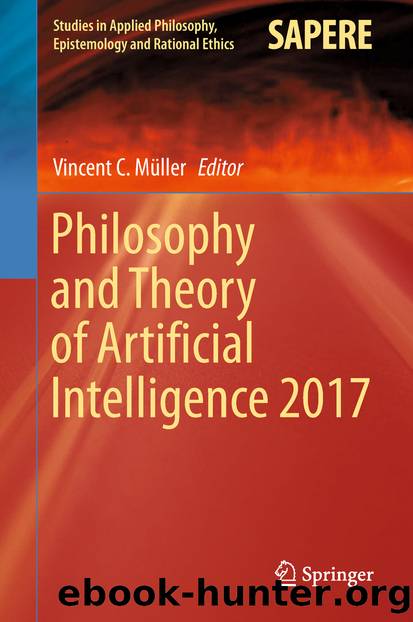Philosophy and Theory of Artificial Intelligence 2017 by Unknown

Author:Unknown
Language: eng
Format: epub
ISBN: 9783319964485
Publisher: Springer International Publishing
22Luger’s book revolves around a fundamental distinction between what he calls weak problem-solving versus strong problem-solving.
23There are a few exceptions. Hummel (2010) has explained that sophisticated and powerful forms of symbolic learning, ones aligned with second-order logic, are superior to associative forms of learning. Additionally, there’s one clear historical exception, but it’s now merely a sliver in psychology (specifically, in psychology of reasoning), and hence presently has insufficient adherents to merit inclusion in the ontology we now proceed to canvass. We refer here to the type of learning over the years of human development and formal education posited by Piaget; e.g. see (Inhelder and Piaget 1958). Piaget’s view, in a barbaric nutshell, is that, given solid academic education, nutrition, and parenting, humans develop the capacity to reason with and even eventually over first-order and modal logic—which means that such humans would develop the capacity to learn in fashion, in school. Since attacks on Piaget’s view, starting originally with those of Wason and Johnson-Laird (e.g. see Wason and Johnson-Laird 1972), many psychologists have rejected Piaget’s position. For what it’s worth, Bringsjord has defended Piaget; see e.g. (Bringsjord et al. 1998).
Download
This site does not store any files on its server. We only index and link to content provided by other sites. Please contact the content providers to delete copyright contents if any and email us, we'll remove relevant links or contents immediately.
Kathy Andrews Collection by Kathy Andrews(11834)
The remains of the day by Kazuo Ishiguro(9000)
Spare by Prince Harry The Duke of Sussex(5197)
Paper Towns by Green John(5191)
The Body: A Guide for Occupants by Bill Bryson(5098)
Industrial Automation from Scratch: A hands-on guide to using sensors, actuators, PLCs, HMIs, and SCADA to automate industrial processes by Olushola Akande(5061)
Machine Learning at Scale with H2O by Gregory Keys | David Whiting(4313)
Be in a Treehouse by Pete Nelson(4052)
Never by Ken Follett(3957)
Harry Potter and the Goblet Of Fire by J.K. Rowling(3859)
Goodbye Paradise(3810)
The Remains of the Day by Kazuo Ishiguro(3413)
Into Thin Air by Jon Krakauer(3400)
Fairy Tale by Stephen King(3399)
The Cellar by Natasha Preston(3345)
The Genius of Japanese Carpentry by Azby Brown(3309)
120 Days of Sodom by Marquis de Sade(3275)
Reminders of Him: A Novel by Colleen Hoover(3121)
Drawing Shortcuts: Developing Quick Drawing Skills Using Today's Technology by Leggitt Jim(3083)
